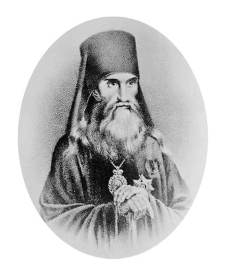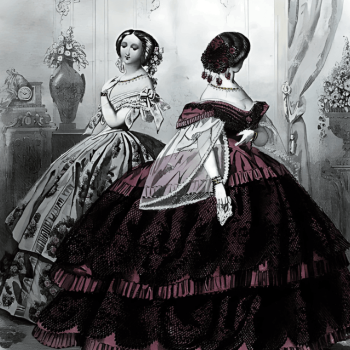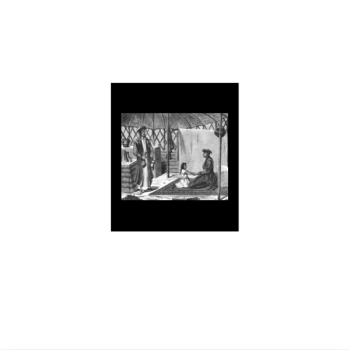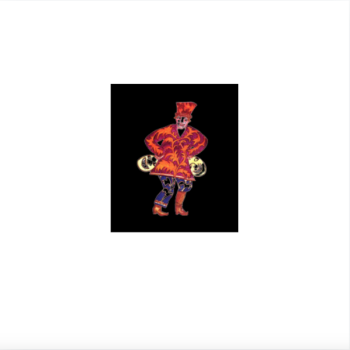EASTER
April 19, 1840
Everyone was still sleeping, exhausted from a sleepless night when Vera was awakened by the frequent, cheerful ringing of bells in all the city churches. Vera instantly remembered what Baba Lena had told her about her birthday, and she jumped up on her bed. Baba Lena always got up early and did not tolerate the shutter, therefore the sun shone brightly through the window, behind which sparrows chirped and pigeons cooed, walking importantly along the slope of the roof.
Vera rubbed her eyes and looked around. Near her crib, there was a small table covered with a tablecloth. On it glittered a copper samovar and small tea utensils painted with blue and pink flowers. There was sugar in the sugar bowl, cream in the milk jug, and on a tray next to it stood a real little babka, all covered with sugar, almonds, and raisins. But this is not enough! Two straw chairs were placed at the table, and on one sat a large doll, waiting for tea, and on the other lay a red woolen sundress. Vera often told Baba Lena that there was nothing in the world that she would like to have more than a red sundress. And now it was in front of her, all embroidered with braid and gold buttons, and with it, a velvet headband, also embroidered with gold and beads. At first, Vera was petrified with delight. Then, without thinking twice, she jumped onto the bed in which Baba Lena was sleeping and smothered her with hugs and kisses!
Baba Lena was startled, frightened almost, but when she saw Vera, she immediately understood what was going on, she laughed and kissed the birthday girl, and beckoned Nanny Nastya to dress her in the new sundress. As soon as she dressed, Lelya came running in, dressed in a new silk dress, and holding a picture book given to her by Helena Andreyevna, and a beautiful box of paints which Baba Lena gave her. Vera did not leave her table and did not let go of the doll. She was so busy with them, in fact, that she completely forgot that it was Easter Sunday, and needed to go to church. She only remembered when Nanny Nastya solemnly entered the room. Dressed in her dark woolen dress and a silk scarf, Nanny Nastya approached Baba Lena, bowed deeply, and offered a Paschal Greeting.
“Christos voskrese,” she said.
“Voistinu voskrese!” Baba Lena replied.
They kissed three times and exchanged eggs.
This interaction was repeated the same way with everyone in the room.
Vera began to fuss, looking among her many eggs for the one she had prepared for Nanny Nastya, until, at last, she found it. (Nanny Nastya was very happy with it.)
After getting dressed, they all went downstairs to have coffee with Dede Andrushka. Then they went up to the hall, where they found a lot of guests. All the men were dressed in their smart military uniforms, embroidered with gold. This made it difficult for Vera to recognize her acquaintances because she had never seen them so shiny. Baba Lena, Helena Andreevna, and Aunt Katya treated everyone at a long table covered with babka and various dishes. Vera noticed that everyone ate very little, and everyone was in a hurry to get somewhere. Then the priests and singers came and sang “Christ Is Risen” and sprinkled all the rooms with holy water.

Archbishop Vecherkov (Yakov Ivanovich Vecherkov) c. 1840.[1]
Then Bishop Vecherkov arrived. He was a tall, handsome old man with a long white beard. Everyone came under his blessing and kissed his hand. An old acquaintance from Ekaterinoslav, he walked with Dede Andrushka and Baba Lena into the living room.[2] The loud conversations and laughter of the guests immediately ceased, and everyone began to talk very quietly and seriously. Vera watched all this, as usual, and thought her thoughts, carefully examining the stars and crosses with multi-colored stones shining on the bishop’s chest. “What a beautiful white cross he has on his hood!” she thought. “How shiny! How tall and important he is. Aleeva is just as beautiful and tall…It’s a pity that she doesn’t have such stars!”
“Nadya!” Vera loudly whispered. “Nadya! Do you think it would be good if Aleeva married a bishop?”
“What?!” Aunt Nadya cried out laughing. “Do you want them to get married? Haha! Mamochka! Helen! Listen to what Verochka is saying here. She proposes to marry the bishop to the nun Aleeva.”
Everyone laughed so hard that Vera almost cried, blushing and not knowing where to go.
“Well, so what?” said Vera through tears. “I only asked because they are both old and so beautiful, and important…I just…I just said that…because…” she stammered. “He is a monk, and she is a nun…”
“‘He’s a monk and she’s a nun,’ she says,” roared Lelya teasingly, “so that’s why they should get married?”
“Oh, my sweet silly girl,” laughed Helena Andreevna. “Monks and nuns cannot marry or get married.”
“Why can’t they?” Vera asked in such a voice as though it had offended her very much, and at that very moment, unable to control myself, covered her face with her hands and cried bitterly.
“Really!” said Baba Lena, coming to Vera’s rescue. “Stop crying, Verochka. They teased you, poor thing! That’s enough, that’s enough!”
At that moment the door opened, and Aleeva herself entered the hall, rustling her long cassock. Vera stood on the chair next to Baba Lena and hastened to hide behind her. Aleeva, having greeted everyone, looked at Vera in surprise.
“What’s wrong with Verochka? Why is she crying so much?”
Everyone answered her with smiles and laughter.
“Well, because of you!” said Baba Lena, trying to hold back a smile so as not to irritate Vera even more.
“Because of me?! How so?” asked Aleeva.
Helena Andreevna began to tell her through laughter. “Well, you see, just now Bishop Vecherkov was with us and Verochka liked him so much that she certainly wanted you to marry him and is angry because we told her that you are not allowed.”
Vera, embarrassed, looked at Aleeva with one eye. Aleeva lifted her wide eyebrows. She tenderly took Vera’s hand, while her pretty mouth trembled, holding back a cheerful smile.
“Thank you, sweet Verochka, for taking such good care of me!” said Aleeva, in a completely serious voice. “She found a wonderful match for me! Thank you! Here’s a golden egg for you!”
Without raising her head, Vera took the egg from Aleeva’s hands, and only after Baba Lena’s intense persuasion, she decided to wipe away her tears. Her egg contained scissors, a thimble, a needle case, and in the other half a tiny prayer book with pictures. “It’s time for you to be able to sew and read soon,” Aleeva explained to her.
Then new guests arrived, and Anna Ivanovna whispered to Vera that she had brought Grunya Zaitseva. Vera immediately ran off to show her the new toys. Soon Klava and Yulia Grechinskaya arrived, and they spent the whole day happily playing with dolls and rolling eggs in the long gallery. Baba Kapka, of course, grumbled that she no longer had red eggs, but they just laughed, not believing her. They knew full well that she had a whole tub of sawdust and red eggs in her pantry.
In the evening, when the guests had left, and Dede Andrushka had gone to bed, everyone sat on the yellow sofa in the parlor. The girls reminded Baba Lena about a fairy tale she promised to tell them about the old man with the sausage.
“Ah! You remembered!” said Baba Lena affectionately. “Well, sit down and listen.”
The girls quickly sat down next to her on the sofa and pricked up their ears.
“In those distant, distant times, when there were still sorcerers and wizards in this world, there lived an old man and an old woman,” said Baba Lena. “They were very poor. Once, they sat in front of an empty fireplace, which they had nothing to eat, and talked sadly. ‘Ah!’ said the old man. ‘If only some kind fairy would appear to us and give us everything we need!’ ‘Yes!’ his wife agreed. ‘It would be great happiness.’ ‘What would we ask her?’ ‘Do we really need so much that I wouldn’t know what to ask for first?’ the old man noticed. ‘This is nonsense!’ the old woman told her husband. ‘Who knows? I would ask for a full tub of gold, eternal youth, beauty!’ ‘Ta-ta-ta!’ said the husband angrily. ‘Now the woman is visible. What do you need beauty for? It’s better to ask for health and a good dinner.’ ‘Old glutton!’ the wife screamed. ‘Fool! If only there was money, there would be dinner!’ So, they sat and quarreled until they suddenly heard a thin voice. ‘Stop it! It’s a shame to argue!’ And at that very second, a small, brilliant sorceress descended from the chimney. The old couple gasped! ‘Well,’ said the fairy affectionately, ‘I allow you to make three wishes, which I will immediately grant.’ The poor old man was so hungry that before he knew it, he said: ‘May a good sausage appear in front of me right now!’ At that, a sausage immediately appeared in front of him on a plate, and even with a slice of bread to boot. ‘Wow!’ exclaimed the wife, angry that he made such a stupid wish. ‘Oh, you old fool! May this sausage grow on your nose!’ And the obedient sausage jumped from the plate and at the same moment grew attached to the poor old man’s nose. ‘Ah!’ the old man yelled. ‘Whatever will I do!? Where shall I go? All the people will laugh at me because I have a sausage instead of a nose! Oh, I’m so unhappy!’ What was the old lady supposed to do? After all, she loved her husband, so there was nothing to do but use the third wish. ‘I wish that the sausage would fall off his nose,’ she said. ‘Well,’ said the fairy, ‘I fulfilled all three of your wishes!’ She then laughed and disappeared. And the poor, stupid old couple were left with nothing except one sausage, which they immediately ate. That’s the whole fairy tale for you, children,” concluded Baba Lena. “What do you think? What is its meaning? What does she teach?”
“Not to quarrel,” said Vera.
Lelya laughed so loudly that no one heard her assumption.
“I know!” Vera shouted with confidence. “This fairy tale teaches us to always want something better than German sausage.”
Everyone laughed, but Baba Lena shook her head. “No, my love. The moral teaching of this tale lies precisely in the proverb that I told you yesterday: ‘Whoever wants a lot, gets nothing.’”
“Or, in Russian, ‘If you chase two hares, you won’t catch either!’” said Helena Andreevna.
Vera went to bed very tired and happy that evening, even though she had not grown as Baba Lena had promised. Not an arshin, not even an inch.[3]
Next→
-
- MOTHERS & DAUGHTERS
- A LANTERN
- CHRISTENING OF THE DOLL
- DASHA & DUNYA
- GRUNYA
- NANNY NASTYA
- NANNY’S FAIRYTALE
- CONFESSION
- IN THE MONASTERY
- PREPARATIONS FOR THE HOLIDAY
- EASTER
- THE DACHA
- THE MELON POND
- MIKHAIL IVANOVICH
- THE WARLIKE PARTRIDGE
- LEONID
- NEW WINTER
- HISTORY OF BELYANKA
- THEATRES AND BALLS
- YOLKA
- REASONING
- ROAD
- CAMP
- IN NEW PLACES
- THE GRAY MONK
- VARENIKI
- THE TRIP TO DIKANKA
- WHAT HAPPENED IN THE DOLL HOUSE
- ANTONIA’S STORY.
- “A WINTER EVENING.”
- THE BLACK SEA
- CRIME AND PUNISHMENT
- PANIKHIDA
- PRINCE TYUMEN
SOURCES:
[1] Jacob (Vecherkov,) Bishop of Nizhny Novgorod. Lithograph by K. Ergot. 1840s.
[2] Fadeyev, Andrei Mikhailovich. Vospominaniia: 1790-1867. Vysochaishe Utverzhd. Yuzhno-Russkago. Odessa, Ukraine. [Russian Empire.] (1897): Part I: 151.
[3] Zhelihovskaya, Vera Petrovna. How I Was Little. A. F. Devrien. St. Petersburg, Russia. (1898): 80-88.













